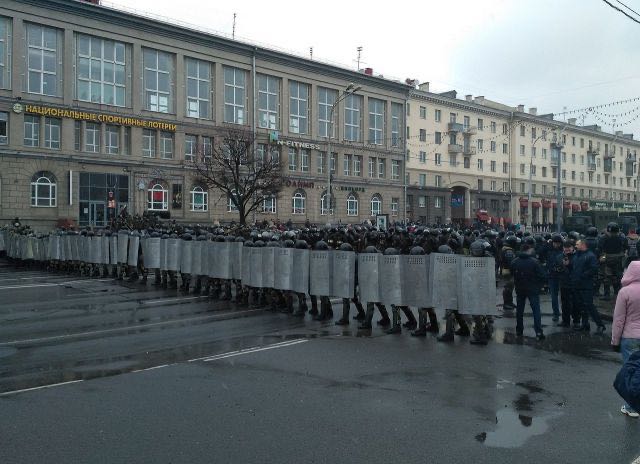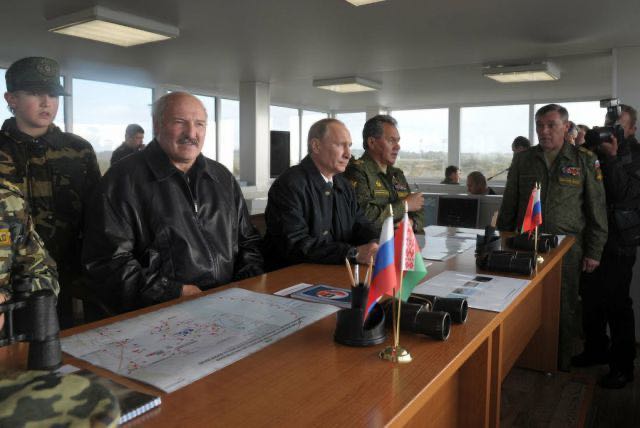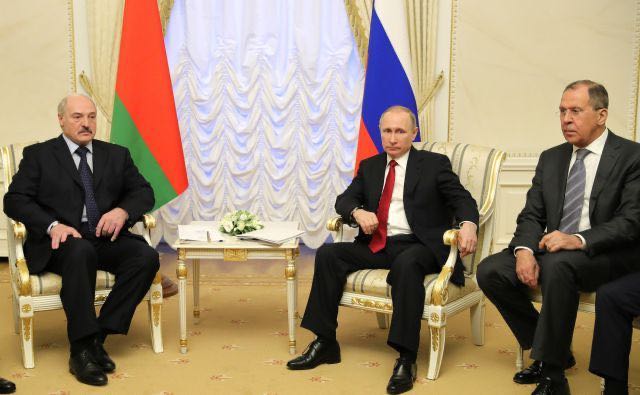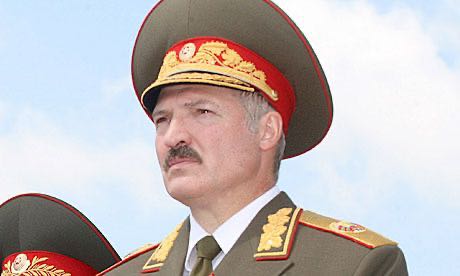Last Monday, April 3, Lukashenko and Putin met in Saint Petersburg to overcome their controversies. After the meeting they announced that all problems and conflicts will be solved within the next weeks. Arseni Sivitski, director of the Belarusian Centre for Strategic Studies, has serious doubts that this will be the case. Unless, he argues, Putin has convinced Lukashenko that Western intelligence services planned a coup to overthrow him. Torn between the EU and Russia, Belarus is rife with conspiracy theories.
The violent suppression of peaceful political protests during the Freedom Day rally in Minsk on 25 March 2017 has driven Belarus into a very vulnerable position.
One the one hand, the suppressive tactics of the Belarussian authorities used against the protests jeopardize the ongoing process of normalization of the relations with the West. On the other hand, the brutal crackdown on civil society didn’t prevent further protests. Despite the fact that more than 700 activists were arrested during the rally on Saturday in Minsk, the next day Belarusians all over Belarus took to the streets to express solidarity with the arrested people.
If the authorities don’t correct their mistakes, Belarus may end up in a strategic deadlock, becoming isolated from the West, undergoing more and more pressure from Russia and losing stability within the country.
 Independence Avenue in Minsk, blocked by riot police during protests in March. Photo: Spadar Burak
Independence Avenue in Minsk, blocked by riot police during protests in March. Photo: Spadar Burak
Social protest
In February and March 2017 Minsk and several other Belarusian cities saw the largest demonstrations of civil society since December 2010, when people protested against the results of the presidential election. Hundreds of people took part in manifestations against the controversial 'social parasite' law which requires those who work less than 183 days per year to pay the government $190 in compensation for lost taxes. They also protested against the deteriorating socio-economic conditions in the country.
Some people from the political opposition, like Vladimir Neklyaev and Nikolay Statkevich, also took part in the demonstrations in February and March 2017. They wanted to transform the socially-oriented protests into a political movement, demanding the resignation of the government and president Lukashenka during the Freedom Day rally in Minsk on 25 March 2017. But before the event even started they were preventively detained, together with oppositional leaders like Anatoly Lebedko, Vitaly Rymashevsky, Yury Gubarevich, Ales Logvinets, Pavel Severinets and Dmitry Dashkevich and 250 activists all over the country.
These arrests coincided with an extraordinary revelation by Alexander Lukashenko: the Belarusian authorities had arrested armed fighters who allegedly were planning to destabilize the situation in the country and overthrow the government during the Freedom Day rally in Minsk.
According to Belarusian officials, fighters allegedly underwent training in camps in neighbouring countries, as Ukraine, Lithuania and Poland and even inside Belarus and were supported by western intelligence agencies. The state media also reported on a series of related incidents, such as gunmen in a car who were attempting by force to pass a checkpoint on the Ukraine-Belarus border.
While some analysts believe that Alexander Lukashenko is simply wary of the mass protests and has used the fabrications about an attempted coup to justify ongoing repression against the opposition and civil society, there is evidence that Lukashenko might have been misinformed by his own secret services, the so called siloviki (strongmen). The Belarusian KGB still has very deep ties with its Russian counterparts, especially the FSB and foreign intelligence service SVR. The KGB even still educates its staff in the FSB Academy in Moscow.
Maidan-scenario
Judging by the preparations of the law enforcement bodies to counter protests during the Freedom Day rally it seems that the authorities reckoned with a possible Maidan scenario in Minsk. One day before the event the mayor of Minsk, Andrey Shorets, announced that all manifestations would be considered illegal.
Several thousands of police and internal security troops in full combat gear, special vehicles for the dispersal of mass demonstrations, water-cannons, as well as armored vehicles for demolishing barricades were present in the city center. Some units were equipped with smooth-bore and automatic guns.
The huge contrast between the peaceful protests and the brutal response confirms that the Belarusian authorities were expecting a worst case scenario of mass unrests. The crackdown also was meant to deter future protests. The overreaction will make people think twice before protesting again.
Both are miscalculations by the Belarusian authorities. The next day after the rallies dozens of people all over Belarus took to the streets to express their solidarity with the arrested activists. It showed that the tactics to spread fear within society don’t work at all, just provoke even more protest sentiments.
This reminds one of Kiev in November 2013. The brutal crackdown on students on Grushevska street inspirited a massive wave of protests that resulted in Euromaidan. The Ukrainian people came out to express its protest to this over-reaction and to show solidarity with the students.
Another miscalculation is based on the presumption that the Belarusian opposition has played a crucial role in provoking the protests. But as a matter of fact the Belarusians are taking to the streets to protest against the deteriorating socio-economic conditions rather than to support the Belarusian opposition in its demand to replace Alexander Lukashenko. Apart from that the opposition of course is trying to evolve socially-oriented protests into political ones.
Belarusian KGB fed by Russian FSB?
In my opinion these miscalculations are the result of disinformation of the president by the siloviki, part of the Belarusian security apparatus, traditionally oriented to Russia.
Before the protests on 25 March Alexander Lukashenko made several public statements in which he referred to intelligence reports of several security services, first of all the Belarusian KGB. According to them, western intelligence agencies, together with the Belarusian opposition and armed fighters form training camps in neighbouring countries, were making preparations for a colour revolution in Belarus.
President Lukashenko (source: Wikimedia Commons)
On 20 March 2017 Alexander Lukashenko claimed that ‘We are more concerned about the attempts to apply modern methods of confrontation to destabilize the situation in Belarus and to carry out corresponding activities against it.[...] This pertains to the attempt of our ‘fifth column' with the financial assistance (we can trace it, I do not threaten anyone), of western funds and with the guidance of western intelligence services to encourage our roughnecks, who have run away from the country abroad, to destabilize the situation in Belarus,’ Alexander Lukashenko explained.
On 24 March 2017 the Belarusian president remarked that the illegal oppositional activities were financed mainly via Lithuania and Poland. ‘They [Lithuania and Poland] got offended when I spoke about Ukraine, Lithuania and Poland in Mogilev. But why should they if this is true?’ the Belarusian leader said. ‘American and German organizations were channeling the money through Poland and Lithuania, and most of the money remained there’. As well as he mentioned that some wanted to create trouble in Belarus. ‘Some want to destabilize the situation, and they use our scumbags for that,’ the president said. ‘They were like partisans, digging pits and hiding stuff. They hid arms, rebars, axes, knives, grenades, etc. They say they teach children to be patriotic. Using what? Ball grenades?’
After these statements former activists of the ‘White Legion’ national patriotic movement led by Miroslav Lozovsky, members of the officially registered Patriot Club in Bobruisk (mentioned by Lukashenko), and Young Front activists led by Dmitry Dashkevich (26 people in all) were detained on fabricated charges of instigation of mass riots.
Remarkable enough president Lukashenko used narratives and facts about the preparation of a Belarusian Maidan, that massively appeared in the Russian media in 2015 – 2016. Even more strange was the fact that the grand design of destabilization in Belarus, in Lukashenko’s words, sounded strikingly similar to the scenario of the Russian-Belarusian joint military exercises ‘Interaction’ and ‘Slavonic brotherhood’ in 2015, prepared by the General staff of the Russian Armed Forces.
This means that the intelligence reports of the Belarusian secret services are based on fake or falsified data as well as purposely false assessments of the political-military situation in and around Belarus provided by Russian intelligence agencies. Because the KGB hasn’t got well-developed foreign intelligence capabilities it usually bases its own assessments on data provided by the Russian counterparts according to bilateral cooperation agreements. And it explains the source of conspiracy theories which Alexander Lukashenko used when he blamed the Western intelligence agencies in attempts to destabilize the country.
This makes one wonder if the brutal crackdown on civil society in Minsk was in fact a deliberate attempt of pro-Russian elements in law enforcement bodies and security agencies with an interest in spoiling the gradually improving relations between the West and Belarus. According to this logic, undermining relations with the West and deteriorating the human rights situation in Belarus drive the country closer to Russia.
Russia-West balancing act more and more problematic
Other analysts argue that Lukashenko, by demonstrating his intolerance towards the opposition, proves his loyalty to Russia with its anti-Western, anti-Maidan course. But this seems to be a simplification and has nothing in common with the complicated geopolitical context that Belarus found itself in since the beginning of the Russia-Ukraine conflict and New cold war.
Tensions between Belarus and Russia have been mounting over the past two years, as the Kremlin puts more and more economic, political, military and even information pressure on Minsk, demanding more political and military control over Belarus. The aim is to transform Belarus into a Cold War forepost for a strategy of escalation towards the West and to generate conventional and hybrid threats to NATO member states and Ukraine.
At the same time Moscow wants to provide itself full access to the territory of Belarus in the case of a large-scale military conflict with NATO (because of Kaliningrad). As long as the Belarusian state is strong and Alexander Lukashenko attempts to maintain neutrality in the confrontation between Russia and NATO by refusing to host Russian military bases on Belarusian territory, this aim is difficult to achieve.
In 2015 Kremlin announced plans to establish a Russian airbase on the territory of Belarus, the next year rumors appeared in the Russian media, airing Moscow’s determination to deploy at least two more military facilities – missile and land bases. The Kremlin plans to place by 2018 the Belarusian and Russian armies and secret services under joint command-and-control structures and thus actually unite them. But as long as Lukashenko is in power this idea seems problematic.
Obviously the stubbornness of Lukashenko contradicts the Kremlin's strategy and this may lead Moscow to instrumentalisation of the Maidan crisis scenario. In short: Kremlin strategists perceive the normalization process between Belarus and the West as a threat to Russia’s sphere of influence.
 Lukashenko and Putin during joint military execises in 2013. Photo: Kremlin.ru
Lukashenko and Putin during joint military execises in 2013. Photo: Kremlin.ru
Against this background the protests in Minsk and the rest of the country in February and March 2017 have spurred debate if Russia could take advantage of the situation to destabilize the country and send in its troops. Looking at the scenario’s of the joint military exercises (Slavonic brotherhood/ Interaction – 2015) there is evidence that the Kremlin is considering the possibility of deploying troops with the excuse to 'stabilise the situation and restore the constitutional order' in response to unrest and destabilization in Belarus.
The West seems very well aware of the complicated context of the Belarus-Russia relations. Understanding possible negative consequences it is therefore not interested in closing the channels of communication with official Minsk. That is why Western capitals are refrain from too harsh criticism on the recent crackdown of protests, in contrast with their response to the violent dispersal of demonstrations on 19 December 2010.
Reintroducing sanctions against Belarus would be a worst case scenario for the country. Isolation of Belarus from the West will lead to increased political-military dependence on Russia and transformation of Belarus into a source of security challenges and threats to the EU, NATO and Ukraine.
Rapid declining economy
Today Belarus faces the main challenge of internal instability due to the rapidly declining economy, growing unemployment, and political intolerance (Belarusian economy was shrinking for the second year in a row – a 3.8% in 2015 and 2.6% GDP decline in 2016). Protest sentiments within society remain high despite the repressive response of the authorities. The inability of the Belarusian government to overcome the crisis and stabilize the national economy due to both external (crisis in Russia, international isolation) and internal factors (deep structural crisis and incompetence) is the main source of the fledgling legitimacy of Lukashenko. Meanwhile the crisis and strategic deadlock increase the contradictions within the power elite. In this undecided situation, the siloviki try to improve their position within the state apparatus.
In the mind of the Belarusian siloviki, improving relations with the West leads to political liberalisation and economic reforms, which provoke protests within society and decrease their influence. So according to them, Lukashenko has to abolish reforms and crack down on civil society and the opposition. They are supported by some elements of the Belarusian bureaucracy apparatus, such as a former National Bank head Petr Prokopovich, who proposes emission solutions to stabilize the economy. These ideas do not coincide with obligations to the IMF, if Belarus wants to receive a $3,5 bln loan, that is currently negotiated. Earlier such emissions in 2011 provoked a deep currency crisis and an almost three-fold devaluation of the Belarusian ruble.
If the Minsk authorities continue to use repression against civil society and the political opposition, in the end the western countries will review their engagement strategy with Belarus. However, the menu of responses is limited to the reintroduction of restrictive measures, reduction of high-level official contacts and downscaling of economic assistance, in cooperation with IMF, World Bank, EBRD and EIB. But it is obvious that Alexander Lukashenko is not looking forward to face Vladimir Putin all alone.
Stronger Russian pressure
Since the start of the Russia-Ukraine conflict Belarus started to worry about Moscow’s policy towards Minsk. The Kremlin is not willing any longer to give Minsk the necessary economic assistance and is even making preparations to interfere into its domestic affairs by political-military means. At the same time, during official talks, the Kremlin does not take the arguments and concerns of the Belarusian leadership seriously. More and more economic pressure is used, resulting in permanent trade wars and restrictions of Belarusian goods on the Russian market, increasing gas prices and insufficient delivery of Russian oil to Belarus. Because of this, in January 2017 alone Belarus lost 1.5% of its GDP. This Russian economic pressure contributes significantly to undermining of the socio-economic and political stability.
 Tense talks in St.Petersburg, April 3. Photo: Kremlin.ru
Tense talks in St.Petersburg, April 3. Photo: Kremlin.ru
During their meeting in Saint Petersburg Alexander Lukashenko and Vladimir Putin discussed the economic and militaryproblems between their countries. The last two years they met regularly in order to overcome their contradictions. Despite the announcement that they would solve all the problems within the next ten days or so, it is not so sure that this will happen.
At one hand, the Kremlin has a record not to keep its promises towards Belarus. At the other hand, it is hard to believe that Lukashenko agreed to make strategic concessions to the Kremlin regarding the Russian military presence in Belarus. Such a step would undermine the sovereignty and independence of Belarus, and would critically weaken his power. However, if Alexander Lukashenko was convinced by his own secret services as well as Russian counterparts that the Western intelligence agencies were preparing a coup in Belarus in order to overthrow him, his idea about Russian military or paramilitary presence may have changed completely: from a source that undermines his power to one that stabilizes and secures the regime.
To overcome its strategic deadlock Belarus needs to implement a reform agenda. But this is impossible without international engagement and economic assistance of the West and possibly China (Belarus is a part of the Silk Road Economic Belt Initiative). Intensification of such cooperation may serve as a positive signal to Alexander Lukashenko that the Western capitals are not planning any colour revolution in Belarus. It will help to quench the arguments of hard-liners within the siloviki and bureaucracy apparatus and at the same time support the reform agenda in the country.
Only an economically strong, politically sovereign and military independent Belarus can contribute to regional stability and security, prevent the Kremlin’s intervention in its domestic affairs and deter a confrontation scenario between Russia and the West.

